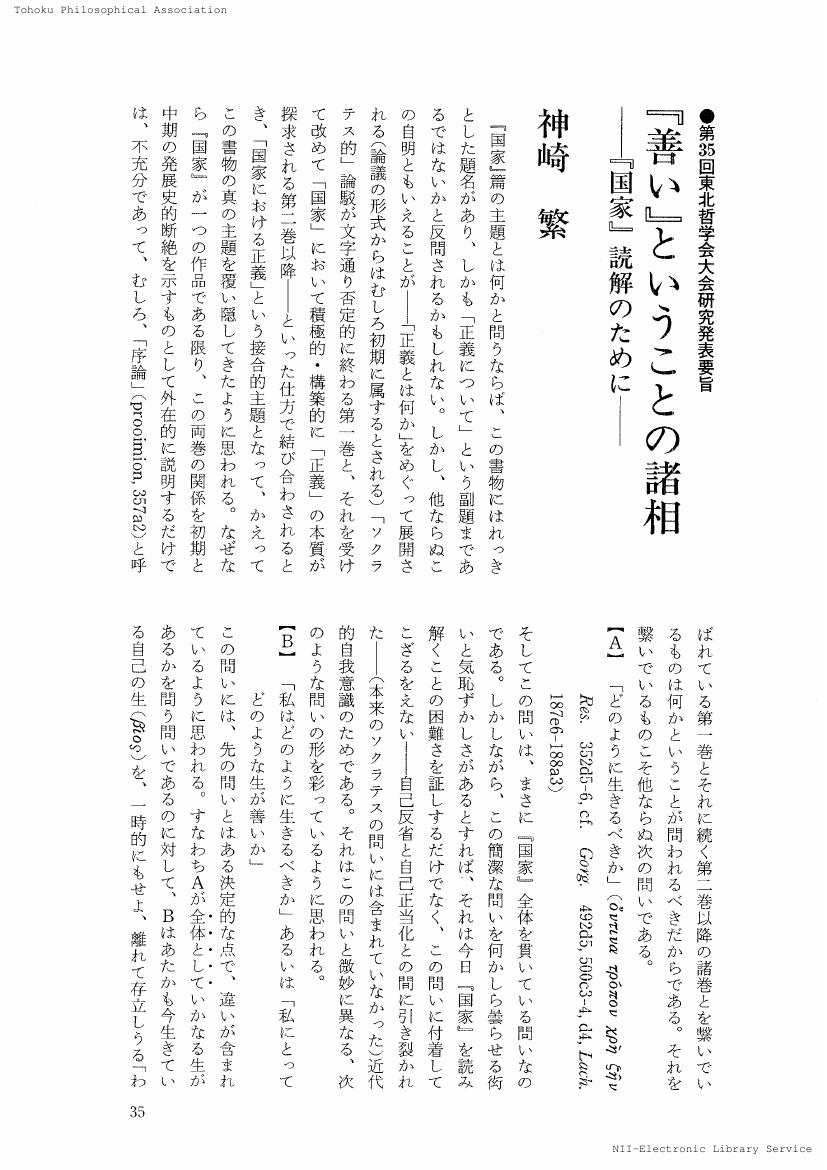4 0 0 0 OA 現実の耐えられない〈薄さ〉をめぐって
- 著者
- 神崎 繁
- 出版者
- 日本哲学会
- 雑誌
- 哲学 (ISSN:03873358)
- 巻号頁・発行日
- vol.2009, no.60, pp.51-66_L5, 2009 (Released:2010-11-09)
- 参考文献数
- 27
The theme of our discussion ‘Reality and Virtual Reality’ seems, if we take it in antagonistic sense, somewhat awkward at this day. For in many occasions of everyday life such as playing with interactive game soft, testing by simulations for driving skills check, or using MRI images for medical diagnoses, ‘Virtual Reality’ is already partially built in our ‘Reality’. But the dark side of this kind of thing is also becoming conspicuous. An animation TV program named ‘Pokemon’ made children be in panic and paralyzed by rapid movements and too much strong stimulations of their images. But we are eventually caught by a suspicion that Reality does not partially consists of Virtual Reality but amounts to Virtual Reality itself. Such an empty feeling of Reality from which we are distanced has a philosophical background.I spell this out by scrutinizing three points or, shall I say, pitfalls (1) an active power of human mind which works on the dead nature, (2) mechanization of human body as a part of such nature, (3) internality of human thought which is insulated from environmental world and only by representations can keep contact with it.And in trying to show a way out from these pitfalls, I also explore some traces of prisoners of the cave in Plato's Republic in Descartes' body-machines as well as in cybernauts put on head-mounted-display.
- 著者
- 神崎 繁
- 出版者
- 理想社
- 雑誌
- 理想 (ISSN:03873250)
- 巻号頁・発行日
- no.696, pp.62-76, 2016
3 0 0 0 プラトンにおける知覚の文法
- 著者
- Burnyeat Myles Frederic 加藤 信朗 神崎 繁
- 出版者
- 岩波書店
- 雑誌
- 思想 (ISSN:03862755)
- 巻号頁・発行日
- no.694, pp.p75-112, 1982-04
2 0 0 0 「知」の変貌・「信」の階梯
- 著者
- 神崎繁 熊野純彦 鈴木泉編
- 出版者
- 講談社
- 巻号頁・発行日
- 2011
- 著者
- 神崎 繁
- 出版者
- 東北哲学会
- 雑誌
- 東北哲学会年報 (ISSN:09139354)
- 巻号頁・発行日
- vol.8, pp.45-53, 1992-08-28 (Released:2018-02-28)
1 0 0 0 OA 『善い』ということの諸相 : 『国家』読解のために
- 著者
- 神崎 繁
- 出版者
- 東北哲学会
- 雑誌
- 東北哲学会年報 (ISSN:09139354)
- 巻号頁・発行日
- vol.2, pp.35-36, 1986-05-10 (Released:2018-02-28)
1 0 0 0 フーコー : 他のように考え、そして生きるために
- 著者
- 神崎 繁
- 出版者
- 日本西洋古典学会
- 雑誌
- 西洋古典学研究 (ISSN:04479114)
- 巻号頁・発行日
- vol.32, pp.41-53, 1984
Many scholars treat the first part of the dialogue (384 c-391 b) as the exposition of Plato's own views about the correctness of names because of its similar phraseology to that of the Republic X and its critical remarks on the Protagorean background of Hermogenes' conventional theory of names. But this treatment not only drops the demarcation between Plato's position and Cratylus', but also prevents them from understanding the overall structure of the dialogue. For, as Bernard Williams recently revealed in his brief but excellent paper, it is Cratylus' natural theory of the correctness of names that Socrates attempts to elaborate with Hermogenes in the next part (391 b-427 d) and then he sets about to refute with Cratylus himself in the final part (427 d-439b). According to my interpretation, however, Plato's strategy is already mentioned to some extent in the first part of the dialogue. Because a name-giving role personified as νομοθετη&b.sigmav; is said not only to precede a name-using role as διδασκαλικο&b.sigmav; but also to be supervised in turn by the dialectician, διαλεκτικο&b.sigmav;, who uses names for discussion. And I suppose these three personified figures to represent the positions of Cratylus, Hermogenes and Socrates respectively. So the main theme in succeeding arguments of the dialogue as well as the dialogue itself seems to be under dialectical supervision. This is a noeud initial of the dialogue. I suggest, therefore, that the notorious etymological section in the second part displays various deviational forms of name-relation from such integral linguistic practice with names as the dialectic. For, though we find in the text somewhat confusing expressions with the same verb 'δηλουν' (to show) , e.g. 'someone shows something by a name.', 'a name shows something to us.', 'a name shows something.', etc., we can presume from them an underlying structure: A shows p with n to B (where A and B are persons, p is a thing, and n a name). This underlying 4-place relation is transformed into the various expressions found in the text without changing the meaning of 'show' in it. But the etymological explanation urges us to think the verb 'show' equivocal like this: A legislator as a name-giver showed^1 something with a name, from which descended name shows^2 it to us. Thus, etymological study turns out to be nothing less than research for original intentions or thoughts of the name-giver-they are usually expressed by a verb 'βουλεσθαι'-, for such intentional factors take advantage of the time- and semantic gap between giving names and deciphering their descendants. But, of course, research for such factors may be uncertain and arbitrary. To do without it, there must be a direct relation between names and things : 'a name shows^3 something'. Being interpreted by similarity, this binary relation though it is also transformed from the same 4-place relation above gets another meaning of 'show': 'a name is a copy of something'. It is this final position of Cratylus' natural theory that is to be refuted in the third part of the dialogue. If we demand the correctness of names for its own sake i.e. apart from our integral linguistic practice, we cannot but rely on either the correspondence between language and reality or tacit consent among people without reference to our understanding the reality whatever we acknowledge it to be. So we must try to understand the truth (that is not the same thing as the correctness anymore) with names and the other linguistic components in the dialectical integrality. This denouement seems to have been already anticipated in the noeud initial of the dialogue.
- 著者
- 神崎 繁
- 出版者
- 日本西洋古典学会
- 雑誌
- 西洋古典学研究 (ISSN:04479114)
- 巻号頁・発行日
- vol.41, pp.139-142, 1993
1 0 0 0 OA アリストテレス哲学の端初
- 著者
- 神崎 繁
- 出版者
- 日本哲学会
- 雑誌
- 哲学 (ISSN:03873358)
- 巻号頁・発行日
- vol.2013, no.64, pp.58-77_L6, 2013 (Released:2014-07-10)
- 参考文献数
- 22
In his Topics Aristotle criticises an alleged definition of being as ‘capable of being acted on or acting on (to dynaton pathein e poiesai)’ (Top. 146a21-32, 148a18-21, cf. 139a4-8). There is an echo of passages where Plato described ‘power of acting on and being acted on (dynamis tou poiein kai paschein)’ as a ‘horos’ of being in the Sophist, though he wavered between this conjunctive formulation (Soph. 248c8) and disjunctive ones (247d8-e2, 248c4-5). A ‘horos’ can be interpreted as a definition or a criterion (G. E. R. Owen insisted on the former meaning, criticising Cornford's preference for the latter). In this respect, Aristotle - who takes it solely disjunctively - would definitely have been on Cornford’s side, judging from his remarks on some of the deficiencies in disjunctive definitions.In the Sophist, the Eleatic stranger asked whether ‘knowing and being known are cases of acting on, or being acted on, or both? Is one of them acting on and the other being acted on? Or is neither a case of either?’ (248d4-7). But in due course Theaetetus responds that if the Friends of the Forms insist on the Forms'unchangeability, they must choose the last option, i. e. in the case of the Forms, neither knowing nor being known is either acting on or being acted on. But this choice implies, in exchange for defending their unchangeability, that the Forms cannot be known. Insofar as Forms are known, they are changed by being acted on, and this is a serious obstacle for the Friends of the Forms. So Aristotle finds the crux of an argument in the equation of being acted on with being changed. And this becomes his target to be resolved.In due course Aristotle must have realized these exchanges left behind one option unscrutinized, i.e. the knower is acted on by the Forms which the knower knows. In the case of sense-perception, though it was in dialectical arguments refuting Protagoras' secret doctrine in the Theaetetus, Plato had already suggested that perceiving is not acting on its objects but rather being acted on by the objects (Theaet. 156a-157b). But later in the Timaeus, Plato still treated sight-perception as an acting on rather than being acted on because he believes that in ‘the visual stream, like makes contact with like and coalesces with it to make up a single homogeneous body aligned with the direction of the eyes’ (Tim. 45b-46c, cf. 67c-68d). When Aristotle explains the so-called doxographical method of collecting preceding views, he mentions the following remarks; ‘We see by admission of something into ourselves, not by an emission; for so it is, too, in the case of the other senses; for in hearing we admit something into ourselves; we do not emit; and we taste in the same way.’ (Top. 105b6-9). This suggests that he criticizes Plato's analysis of vision without mentioning him and even tries to change that view by an analogy with the other senses. We can acknowledge this as a dialectical procedure like ‘change of mind’ (metabibazein) described in E. E. 1216b30 and Top. 101a33.......
1 0 0 0 OA プラトンにおける「死後の神話」の哲学的意義の国際的研究
- 著者
- 荻原 理 神崎 繁 納富 信留 FERRARI Giovanni BRISSON Luc
- 出版者
- 東北大学
- 雑誌
- 基盤研究(C)
- 巻号頁・発行日
- 2010-04-01
G. Ferrari, S. Obdrzalekを招き、東北大学にてシンポジウム「プラトンの神話」を開催した。『国家』第10巻の「エルの神話」における<あの世での、これから生きる生の選択>についての英語論文を国際プラトン学会大会(慶應義塾)で発表し(審査有)、改訂版を電子ジャーナル誌PLATOに掲載した(査読有)。『法律』第10巻の、死後の魂の再配置の話についての日本語論文をギリシャ哲学セミナー大会(専修大学)で発表し、同セミナー『論集』に掲載した。『法律』のこの話が置かれた文脈(宗教法)についての英語論文をシンポジウム「自由と国家―プラトンと古典的伝統」(オクスフォード大学)で発表した。
1 0 0 0 OA 二つの合理性
- 著者
- 神崎 繁
- 出版者
- 日本哲学会
- 雑誌
- 哲学 (ISSN:03873358)
- 巻号頁・発行日
- vol.1999, no.50, pp.42-60, 1999-05-01 (Released:2010-05-07)
- 参考文献数
- 44
人が学ぶのは技巧ではなく、正しい判断を学ぶのである。もちろん規則はあるが、それは如何なる体系もなしておらず、ただ経験を積んだ者のみがそれを正しく適用することができる。それは計算の規則とは異なっている。ここで、最も困難なのは、この不定な規則を正しく、しかも改変を加えることなく、表現へともたらすことである。[ヴィトゲンシュタイン『哲学探究』第二部.xi]
1 0 0 0 道徳的価値の認知における発達に関する論理的実在論の視角からの検討
平成7年度は、本研究課題に基づく研究の最終年度にあたるので、その研究成果を纏める意味でも、古代から現代までの道徳的価値をめぐる様々な立場の歴史的再検討と、現代的視角からの原理的研究の双方にわたって、研究分担者の各自の領域に関して研究を行い、その成果を発表してきた。古代に関して神崎は、特にアリストテレスにおける生命の原理としての「魂」概念の関係において、しばしばその生物学的・自然主義的価値理解が問題とされる点を整理し、価値認知がむしろ習慣的な「第二の自然」としての性格を持つ点を確認した。伊吹は、新約聖書における「アガペ-(愛)」の概念を分析して、その価値の志向的性格を明確にした。また樋口は、ニーチェにおける「テンペラメント(気質)」の概念に注目して、ヨーロッパの既成の価値概念の転倒を主張するニーチェの真意を明らかにする作業を行った。岡田は、ハイデガ-における価値哲学批判の意義を、以上の歴史的考察の背景において位置付ける考察を行った。そして丹治は、最近公刊された著書において、言語の共有ということの意義を検討することを通して、全体主義的言語観における価値の問題の位置付けに関する原理的考察の端緒を開いた。また、神崎は研究総括者として、そのような原理的研究において、所謂自然主義的立場の可能性に関して、丹治の立場を批判的に検討することによって、議論を深めることができた。また、以上の研究成果の一部を、報告書として公表すべく、その準備作業を行った。



